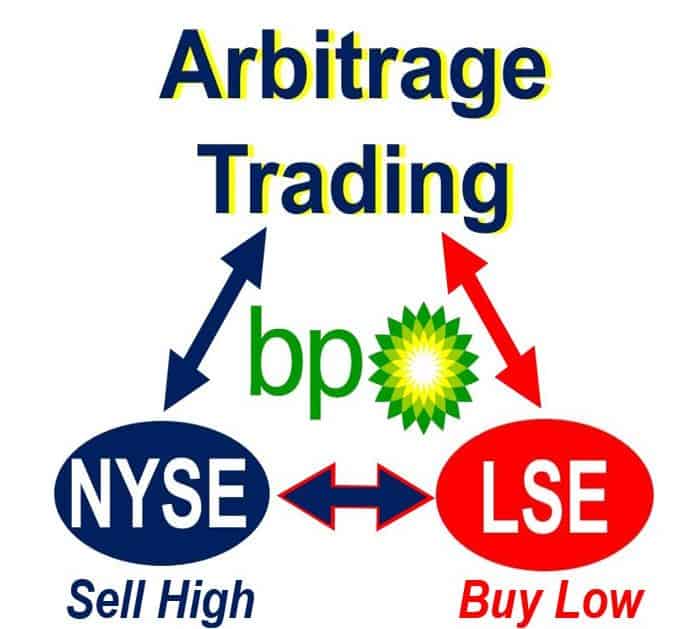Arbitrage is the simultaneous trading of currency, commodities, securities, or other financial instruments in different markets or derivative forms. The aim of arbitrage is to exploit the differing prices for the same asset. The arbitrageur buys in one market and simultaneously sells in another.
Financial instruments are monetary contracts between different entities which people can buy and sell.
The arbitrageur specifically sells where there is a marginal price differential. Consequently, arbitrageurs profit from a temporary difference.
The term has nothing to do with arbitration – a non-judicial process for the settlement of disputes.
Arbitrage is a full hedge, i.e. a risk-free transaction. In fact, arbitrageurs play a key role in maintaining liquidity and efficiency within markets.

BP shares sell both in the New York Stock Exchange (NYSE) and the London Stock Exchange (LSE). An Arbitrageur might simultaneously buy BP shares low in LSE and sell them high in NYSE. When the Arbitrageur performs these simultaneous actions, we call it arbitrage trade.
Arbitrage – Buying and selling simultaneously
Arbitrage is a sophisticated form of risk-free, non-speculative betting. It is risk-free because it involves transactions where prices and returns are definite and evident. The markets where the items are bought and sold simultaneously guarantee their prices.
Experts say that only in very exceptional situations, such as financial crises, is the activity not risk-free. In fact, in a financial crisis, arbitrage can lead to bankruptcy.
The term does not mean buying something in one market and selling it later in another for a greater price. The buying and selling must occur simultaneously. By buying and selling at the same time, the trader reduces market risk to a minimum.
With arbitrage, there is no time lapse between buying and selling. In fact, if there is even a tiny time lapse, it is not arbitrage.
This simultaneous buying and selling is only possible with securities and other financial products that can be traded electronically. In other words, human beings are too slow, so we have to use electronic machines.
Arbitrage – buy low and sell high
An arbitrage opportunity arises when you can instantaneously buy low and sell high.
A person who engages in this kind of trade is called an arbitrageur. Most arbitrageurs work either in a brokerage firm or a bank.
Imagine somebody is selling a dining set for $20 in Chicago while in Miami that set costs $40. If you buy the set in Chicago and sell it in Miami, you can make a $20 risk-free profit.
You make an instant profit because the higher price for a set in Miami guarantees it.
In financial markets, traders frequently try to take advantage of arbitrage opportunities. A trader may, for example, buy a stock on a foreign exchange before they make adjustments for currency fluctuations. The stock on that foreign exchange is, therefore, selling below its real value.
Therefore, if traders buys abroad and sell at home, they will make a profit. In an arbitrage situation, the trader buys and sells the item at the same time.
Markets across the world are not 100% efficient. In fact, if markets were totally efficient there would be no arbitrageur. Inefficiency, no matter how seemingly insignificant, creates opportunities for the arbitrageur.
Traders need to make sure they can make a profit after paying for transaction costs.
If it costs $10 to transport that dinner set from Chicago to Miami, the trader still makes a profit. The trader’s margin before the cost of transport is $20.
Etymology of arbitrage
Etymology is the study of the origin of words. According to Etymonline.com, the word ‘arbitrage’ first appeared in the English language in the late fifteenth century, with the meaning ‘exercise of the function of an arbitrator’.
It came from Old French arbitrage ‘judgment, arbitration’, which came from Old French aritrer ‘to judge, arbitrate’, which originated from Late Latin arbitrari and arbiter.
In the sense of a trader making a profit from the price the differentials of the same product, it was first defined by Mathieu de la Porte. Porte used the term in treatise ‘La science des négociants et teneurs de livres’ (Science Merchants and Bookkeepers) as a consideration of the differing exchange rates to recognize the most profitable places to issue and settle a bill of exchange.
In this context, ‘profitable’ means able to make a profit.
Video – What is an Arbitrage?
This Investors Trading Academy video explains in simple terms what an arbitrage is.
